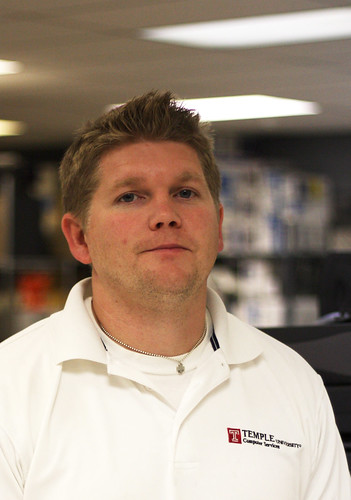
TU Recycled Office Supplies is saving faculty money.
Jonathan Latko picked up a drawing pad of the floor, propped it up against a stack of boxes and looked around at the collection of rolls of scotch tape, reams of paper, stacks of legal pads, binders and envelopes all piled neatly on racks, lining the walls of the relatively small storage room.
The room is the hub of the new TU Recycled Office Supplies, a pilot project started by Latko through the university’s Computer Recycling Program to collect unused office supplies and freely recycle them amongst university administrators and staff.
Latko, the assistant director of the Computer Recycling Center, started the project in 2009 as a way to ease the flow of office supplies that the CRC had begun collecting. Latko received his master’s degree from Fox School of Business in 2003.
“Back in 2009, when they knocked down the [University Services Building] for new student housing, we walked through and there were just tons of office supplies, so we just started picking up stuff,” Latko said.
Soon afterward, he began setting up “swap tables” at university events such as Sustainability Week, where students could sign a sustainability pledge in order to get free supplies.
Latko then partnered up with Debbie Campbell, an assistant dean at Fox School of Business, and her marketing students as a way of promoting the exchange of office supplies around Main Campus.
The swap tables helped get TU Office Supplies its start, but did not give the project the potential its organizers hoped for.
“At a swap table, people don’t always see the point, it’s more about free stuff,” Latko said.
During the summer, Latko and Campbell built the project into an interdepartmental exchange program in which faculty could get rid of unused supplies while simultaneously shopping for supplies they needed.
Campbell recruited marketing students including senior Kelly Bowe to intern for the project, and also partnered with students from Fox School of Business and the Students for Responsible Business.
With the help of SRB, the project began expanding.
“We did a ton of marketing programs from Facebook to Temple Today, even getting on the news calendar to promote our events and meetings,” Bowe said.
Through their marketing techniques, interest in the program has come in from multiple departments.
While organizers said that interest in participation is high, they said they have to step up their efforts to keep the program successful.
One of the main issues the project faces is moving donated supplies to their storage room on the third floor of the TECH Center. Faced with calls coming from donors who want to have their supplies picked up, volunteers have to run “pick-up blitzes,” in which they go around to the schools collecting as many supplies as they can.
Students in SRB have worked specifically within Fox School of Business to regularly collect office supplies and bring them to the TECH Center.
Still, it has been hard for the leaders of the project to gauge how much they actually collect on a weekly basis.
“They are bringing in all sorts of things, but mostly in spurts,” Latko said. “We think they have closets full stuff to get rid of, but nobody wants to pay the facility fee to have things brought over.”
The organizers of TU Recycled Office Supplies believe that departments could save hundreds or thousands of dollars from their supply budgets by obtaining free supplies through the project. Recently, Beasley Law School picked up 120 binders from the supply, center saving them approximately $500.
Participating departments are encouraged to sign a “sustainability pledge” to promote both donating and receiving within the project.
Organizers remain optimistic that the project will gain momentum as word of it spreads among departments and faculty.
So far, Fox School of Business, Beasley School of Law and the College of Science and Technology have shown the most interest in the project.
Latko, who said he hopes to get more faculty involved by sending out pamphlets and information on meetings, said that “the people that do come want to see this work, they give back too so it can be sustained.”
Students are also encouraged to participate in the project by donating supplies and volunteering on Wednesdays from 2 p.m. to 4 p.m.
John Moritz can be reached at john.moritz@temple.edu.


Be the first to comment